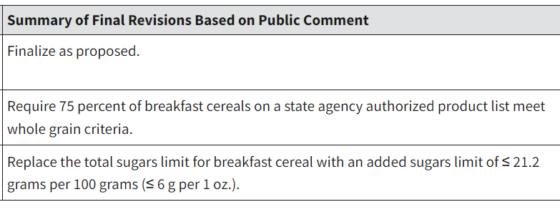
The updated and better WIC package: a look
The USDA has made some changes to food packages for participants in the Special Supplemental Food Program for Women, Infants, and Children (WIC).
In a Q and A, the USDA explains the changes and why it made them.
What are the WIC food packages?
The WIC food packages provide supplemental foods designed to address the specific nutritional needs of income-eligible pregnant, breastfeeding, and non-breastfeeding postpartum individuals, infants, and children up to five years of age who are at nutritional risk.
WIC participants receive a monthly benefit from one of seven science-based food packages, according to their life stage nutritional needs. Participants then use their WIC electronic benefit transfer (EBT) card to buy the food and beverages in their package.
If you want to know what’s actually in the package, it’s a lot easier to go to state sites; the USDA site does not help much.
Try New York State’s WIC site. Women with children can use their EBT benefits to buy these foods (women with infants can also get formula and baby food):
- Low fat (1{dfac5e6feebc182a3317a1800a78117261554ecfb6a579338c4abc2638d58697}) or nonfat (skim) milk for women and children two years of age or older
- Whole milk for children one to two years of age
- Cheese, yogurt, evaporated milk, evaporated goat’s milk, or dry milk as milk substitutions
- Soy beverage and tofu as milk alternatives
- Dry beans, canned beans or peanut butter options
- Whole wheat bread or other whole grain options (whole wheat tortillas, brown rice, whole wheat pasta) for children and pregnant and mostly or fully breastfeeding women
- Cash value benefit for fresh, frozen or canned vegetables and fruits
- Women receive $11.00-$16.50 depending on breastfeeding status
- Children receive $9.00
- Eggs
- Whole grain cereals
- 100{dfac5e6feebc182a3317a1800a78117261554ecfb6a579338c4abc2638d58697} unsweetened fruit juice
- Canned fish for fully breastfeeding women
Going back to the USDA site. I looked at the changes, lots of them excellent.
One is expanded benefits in general, and for fruits and vegetables in particular.
Another is improved benefits for women who are breastfeeding.
But for Breakfast Cereals, here’s what the USDA proposed.And here’s what it got, post lobbying.
The bottom line: less whole grain, and more sugar.
Does this make any difference?
In principle, yes. The USDA should not make decisions based on the food companies’ demands to make their products qualify more easily for WIC purchases.
It would be good to keep as much ultra-processed junk food as possible out of the WIC package.
These cave-ins are unlikely to make any noticable difference to health, but set a bad precedent.
Here’s what happened with the rest of the package, mostly to the good.
- Fruits and Vegetables
- Juice
- Milk and Milk Substitutions
- Infant Foods
- Add Infant Formula Flexibilities and Create a Separate Food Package for Partially (Mostly) Breastfeeding Participants
- Whole Wheat Bread,
- Whole Grain Bread, and Whole Grain Options
- Canned Fish
- Legumes and Eggs
- Maximum Monthly Allowances
The post The updated and better WIC package: a look appeared first on Food Politics by Marion Nestle.


